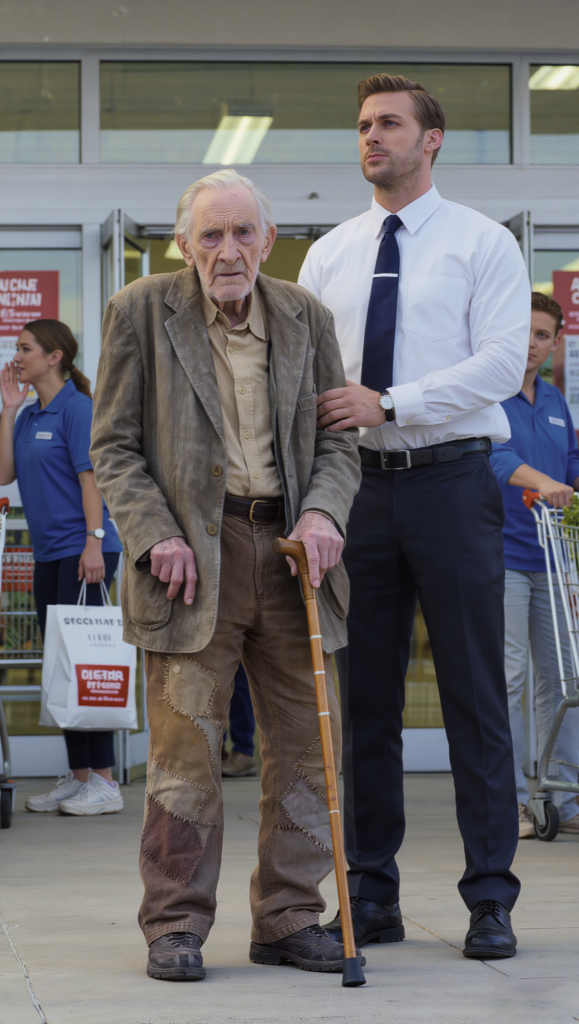The Weight of Ninety Years
At ninety, I never imagined I’d be the kind of man spilling his heart to strangers. But at that age, appearances lose meaning. All you want is the truth laid bare before time runs out.

My name is Mr. Hutchins. For seventy years, I built the largest grocery chain in Texas. I started with one small corner shop after the war, when bread cost a nickel and people left their doors unlocked. By eighty, my chain had spread across five states. My name was on every sign, every contract, every check. People called me the “Bread King of the South.”
But here’s what wealth cannot give you: warmth in the night, someone’s hand to hold in sickness, or laughter at the breakfast table.
My wife passed in 1992. We never had children. One night, sitting alone in my sprawling house, I asked the hardest question: Who will inherit everything?
Not greedy executives. Not polished lawyers. I wanted someone real—someone who understood dignity and kindness when no one was watching.
The Disguise
I dug out my oldest clothes, rubbed dirt across my face, and skipped shaving for a week. Then I walked into one of my supermarkets, looking like a man who hadn’t eaten in days.
The stares were immediate. Whispers followed me aisle to aisle.
A cashier, barely twenty, wrinkled her nose and said loudly, “He smells like spoiled meat.” Her coworker laughed.
A man in line pulled his son closer.
“Don’t stare at the bum, Tommy.”
“But Dad, he looks—”
“I said don’t.”
Every step felt like walking through a courtroom where my empire was the defendant.
Then the words that cut deeper than any knife:
“Sir, you need to leave. Customers are complaining.”
It was Kyle Ransom, the floor manager I had promoted years ago. Now he looked at me like I was nothing.
“We don’t want your kind here.”
Your kind. The man who built this empire.
I clenched my jaw, ready to leave. But then—a hand touched my arm.
The Sandwich
I flinched. People rarely touch someone who looks homeless.
A young man, late twenties, tie faded, sleeves rolled up, tired eyes. His name tag read Lewis — Junior Administrator.
“Come with me,” he said gently. “Let’s get you something to eat.”
“I don’t have money, son,” I croaked.
He smiled—genuine, warm. “That’s okay. You don’t need money to be treated with respect.”
He guided me into the staff lounge, poured a cup of hot coffee, and placed a wrapped sandwich in front of me. Then he sat across, looking me straight in the eyes.
“You remind me of my dad,” he said softly. “He passed last year. Vietnam vet. Tough man. He had that same look—like he’d seen too much life.”
“I don’t know your story, sir,” he continued, “but you matter. Don’t let anyone here make you feel otherwise.”
I stared at that sandwich as if it were gold. And in that moment, I almost revealed who I really was.
The Choice
I left that day with tears hidden behind the grime of my disguise. Nobody knew who I was—not the laughing cashier, not the manager who dismissed me, not even Lewis, who offered food and dignity.
That night, in my study, I rewrote my will. Every dollar, every building, every acre—I left it to Lewis. A stranger, yes. But no longer a stranger to me.
The Reveal
A week later, I returned—polished suit, cane, Italian shoes. My driver opened the door, automatic doors sliding like royalty.
Smiles and greetings followed. “Mr. Hutchins! What an honor!”
Even Kyle, the manager who had thrown me out, rushed forward, pale. “M-Mr. Hutchins! I had no idea!”
Across the store, our eyes met. Lewis nodded—not a wave, not a smile, just a quiet acknowledgment. He understood everything.
That night, Lewis called. “Mr. Hutchins… I knew it was you. I recognized your voice. I didn’t say anything because kindness shouldn’t depend on who a person is. You were hungry. That’s all that mattered.”
The next morning, I returned with lawyers. Kyle and the cashier were dismissed. And before the staff, I announced:
“This man,” I said, pointing to Lewis, “is your new boss—and the next owner of this chain.”
Gasps filled the room. Lewis stood stunned as the world shifted around him.
The Test of Character
Then an envelope arrived—no return address. One line inside:
“Do not trust Lewis. Check the prison records, Huntsville, 2012.”
I investigated quietly. Lewis had been arrested for car theft at nineteen. Served eighteen months.
I called him in. Calm, composed, ready for judgment.
“Why didn’t you tell me?” I asked.
“I was nineteen. Reckless. I paid my debt,” he said. “I didn’t hide the truth; I just knew you’d close the door. Prison taught me who I wanted to be. That’s why I treat people with dignity—because I know what it feels like to lose it.”
I saw not a flaw, but a man forged by fire.
The Legacy
Relatives appeared, angry, greedy. But I told them: Blood doesn’t make family. Compassion does.
I poured everything into the Hutchins Foundation for Human Dignity—food banks, shelters, scholarships—naming Lewis its lifelong director.
He whispered, holding the papers:
“Character is who you are when no one’s watching. You proved that today. I’ll make sure your name stands for compassion long after we’re gone.”
I’m ninety now. I don’t know how much time I have left. But I leave the world at peace.
Not to a blood heir. Not to wealth or titles. But to a man who treated a stranger with kindness, expecting nothing in return.
And that, I realized, is the truest legacy.